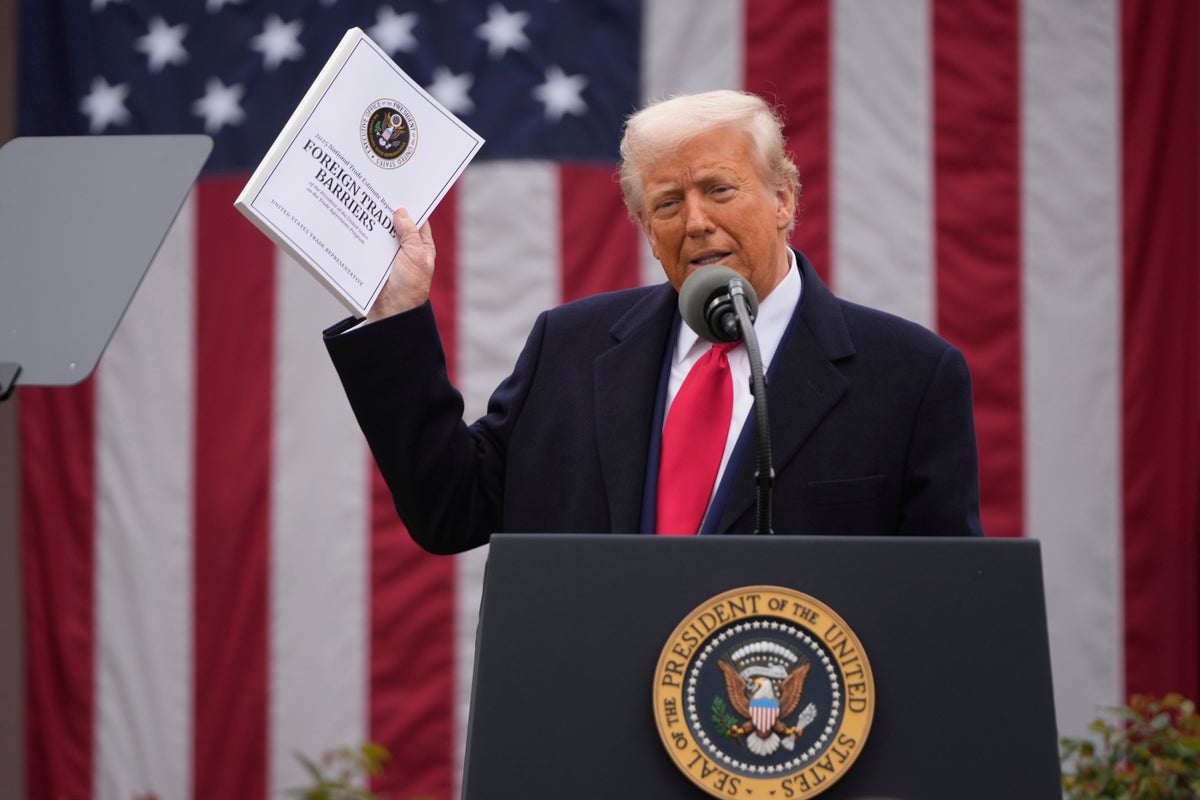
Sir Keir Starmer’s government has threatened to hit the US with retaliatory tariffs if the UK cannot strike a trade deal with Donald Trump.
Business secretary Jonathan Reynolds said ministers will look at “possible retaliatory action” in response to 10 per cent levies on British goods entering the US,as officials work through 417 pages of products they could target in a list that includes everything from bourbon whiskey to motorbikes.
It comes as the prime minister was unable to rule out another tax raid or more cuts to benefits in a bid to balance the government books. The Office for Budget Responsibility (OBR) had already warned that the Trump tariffs would wipe out the fiscal headroom chancellor Rachel Reeves clawed back with her spring statement last week.
As businesses began to assess the economic turmoil unleashed by the US president, the Federation of Small Businesses (FSB) revealed that around a third (32 per cent) of small and medium-sized firms have been hit by the tariffs.
Meanwhile, international markets were in turmoil, led by the Dow Jones losing more than 1,500 points on the day’s trading. The US dollar hit its lowest point for six months as the EU warned that Mr Trump had struck “a major blow” against the world economy.
With a full-blown trade war looming, Ursula von der Leyen, president of the European Commission, said on Thursday the bloc was “prepared to respond” to Mr Trump’s tariffs, while French president Emmanuel Macron condemned them as “brutal”.
The UK prime minister again appealed for calm but acknowledged at the launch of his local government campaign in Chesterfield that the world is at the beginning of a “new economic era”.
Sir Keir said “we have to act and lead differently”, describing the response to President Trump’s tariffs as “not just a short-term tactical exercise”.
“It is the beginning of a new era, we need to understand that, just as we have for defence and security, we have to understand the changing world when it comes to trade and the economy,” he added.
Asked by The Independent whether he could rule out further benefit cuts to fill any hole in the public finances left by Mr Trump’s trade war, the prime minister said the Budget was a long way away.
He said: “There’s a lot of water that will have to go under the bridge before then. Obviously, my job, our job, the government’s job, is to take the steps necessary in our national interest, which is why we’re focusing on progressing the deal that we’ve been discussing with the US, making sure that we are in a position to take other measures, should they be necessary, but at the same time continuing and turbocharging the work we’re doing on growth and reform and changing our economy.
“I’m not going to get into what may or may not happen in six months’ time.”
Economists and businesses warned of a “seismic change” to world trade since Mr Trump unleashed his tariffs on Wednesday night.
Emily Fry, senior economist at the Resolution Foundation, said: “The newly announced tariffs represent a seismic change in trade policy, taking US tariffs back to rates not seen since the early 20th century and generating significant volatility in the financial markets.”
Already there had been warnings of 25,000 job losses in the motor industry in the UK, due to 25 per cent tariffs on automobiles and parts, but other sectors were also counting the cost. The British Beer and Pub Association pointed out that its £126m trade with the US could be wiped out with a 25 per cent tariff charge on aluminium cans.
Its chief executive Emma McClarkin said: “A 25 per cent tariff on beer imported into the US is a direct hit to the brewers of the UK, who contribute so much to this country’s economy and heritage.”
Alongside Mr Reynolds’s statement in the Commons, the government published an “indicative list of potential products that the government considers most appropriate for inclusion” in any fightback – which spanned more than 400 pages.
The list, which is said to “demonstrate what products may be subject to any future UK tariff response”, includes key US products such as bourbon whiskey, motorcycles, guitars and jeans but also scores of other items, ranging from whale meat to chopsticks.
Mr Reynolds, who set a deadline of early May for the consultation, also told the House any action would be “paused” if a trade deal was struck.
No 10 denied the month-long exercise meant they were dithering, while Sir Keir brushed off suggestions he should “jump straight into a trade war” with the US, describing this as “a really important moment”.
“That is why we are sensibly doing what is necessary,” Sir Keir said.
Earlier, Mr Reynolds insisted “America is a friend” despite the tariffs, due to come into force this weekend.
Hours after the US president ushered in a new era for global trade and accused foreign countries of “ripping off” America, he said he was “disappointed” by the levies, but insisted: “America is a friend, America is our principal ally.
“Our relationship is an incredibly strong economic one, but also a security one and a political one as well.”
It came after Australian prime minister Anthony Albanese said Mr Trump’s decision to slap tariffs on his nation, at the same level as the UK, was “not the act of a friend”.
In a sign the UK is still hopeful of a US trade deal to solve the tariff problem, Sir Keir defended the US president’s announcement while acknowledging that “clearly, there will be an economic impact” from the tariffs. “Last night, the president of the United States was acting for his country, and that is his mandate,” the PM said. “Today, I will act in Britain’s interests with mine.”
Mr Reynolds said the UK must keep “every tool available” as it looks for ways to respond, but said he would “remain engaged while there is the potential for a deal”.
Talks are ongoing and Mr Reynolds has said Britain is the best placed country in the world to negotiate its way out of the dispute with the US.
Writing in the Telegraph, former chancellor Jeremy Hunt urged Sir Keir to “resist the siren song of protectionism” and embrace Brexit freedoms to turn Britain into “Singapore-on-Thames”.
He said: “Countries like Singapore demonstrate, openness can still deliver excellent results. Over the last half century, its living standards have grown five times faster than ours.
“Those who deride the idea of “Singapore-on-Thames” fail to understand that the heart of their success has not been a harder-edged social policy but the building up of internationally competitive businesses through a willingness to trade.
“But Singapore didn’t invent free trade. That honour belongs to Britain. Even if others turn their backs on it, we should remember the benefits of one of our greatest gifts to the world.”
Other business leaders warned the PM from responding with even more tariffs saying they would only escalate the global trade war.
Rain Newton-Smith, director-general of the CBI, said that there would be no winners in a trade war. She said retaliation would “only add to supply chain disruption, slow down investment and stoke volatility”.
Source: independent.co.uk


